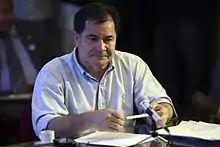Roger Pinto
Roger Pinto Molina (23 April 1960 – 16 August 2017) was a Bolivian right-wing politician.[1][2]
Roger Pinto | |
|---|---|
 | |
| Senator for Pando | |
| In office 2005–2012 | |
| Member of the Chamber of Deputies | |
| In office 1997–2002 | |
| Constituency | Pando |
| Personal details | |
| Born | Roger Pinto Molina 23 April 1960 Santa Rosa de Yacuma, Bolivia |
| Died | 16 August 2017 (aged 57) Brasília, Federal District, Brazil |
| Cause of death | Plane crash |
| Political party | ADN (1997–2009) PPB-CN (2009–2013) |
Life and career
Pinto was born in Santa Rosa de Yacuma, Beni. He was elected to the Chamber of Deputies in 1997, from the single-member constituency 67 in Pando (covering areas in the provinces Nicolás Suárez, Manuripi and General Federico Román) as a Nationalist Democratic Action (ADN) candidate. His alternate was Edgar Balcázar Velasco.[1] He has also been the Prefect of Pando.[2]
As of 2002, Pinto served as Director of the Baptist Church, Technical Assistant of the Central Bank of Bolivia, president of the Cooperativa de Teléfonos, Cobija, member of the national directorate of the Telephone Cooperatives Federation (FECOTEL), president of the Electoral Court of Pando, president of the Asociación de Ganaderos, Pando, municipal council in the city of Cobija and departmental executive secretary of ADN.[1] Pinto is also a major land-owner, owning a 3,269 hectares of land in El Lago and El Atajo (both areas in the municipality of Porvenir).[2]
In 2005, Pinto was elected to the Senate as a Podemos candidate from Pando.[3] He served as the head of the Podemos faction in the Senate.[4] He was reelected to the Senate in 2009, as a candidate of Plan Progress for Bolivia – National Convergence.[5] His alternate is Linda Flor Brasilda Villalobos.[6]
Accusations and failed asylum
Pinto was accused of involvement in the September 11, 2008 massacre in Porvenir.[7] The Bolivian government accused Pinto of having, during his tenure as prefect of Pando, sold twenty-two hectares of land to the department of Pando for the 'ridiculous' amount of US$17,515.[2]
As of 2012, he sought refuge in the Brazilian Embassy in La Paz. He was granted asylum in Brazil but was not given safe conduct by Evo Morales Government to leave Bolivia.[8][9][10]
Pinto left the Brazilian Embassy Friday 23 August 2013 with the help of people from the Embassy. This help was allegedly granted by the indirect influence of the Brazilian foreign minister Antonio Patriota. Patriota resigned from office because of his action 27 August 2013.[11][12]
Death
Molina died on 16 August 2017 at the age of 57 from injuries sustained in a small plane crash that he was piloting.[13]
References
- Directorio: 1997 - 2002. La Paz: Centro de Investigación del Congreso Nacional (CICON), 2002. p. 193
- Se recupera la soberanía en Pando
- REPUBLIC OF BOLIVIA LEGISLATIVE ELECTION OF 18 DECEMBER 2005
- La derecha "en pie de guerra"; Evo tentado a gobernar con decretos
- Lista Nómina de Senadores y Diputados electos el 2009
- Conformación del Senado
- Cónsul acusa a senadores Bravo y Pinto de cómplices en la masacre de Pando
- El linchamiento de dos brasileños en Bolivia tensa las relaciones bilaterales
- Senador boliviano cumple tres meses refugiado en embajada de Brasil
- "Escape from Bolivia". The Daily Beast. 2013-09-02.
- "Brazil's top diplomat resigns amid soaring tensions with Bolivia over asylum for politician". The Sydney Morning Herald. 2013-08-27.
- "Brazil foreign minister quits over Bolivia senator row". BBC News. 2013-08-27.
- Morre em Brasília ex-senador boliviano Roger Pinto Molina (in Portuguese)